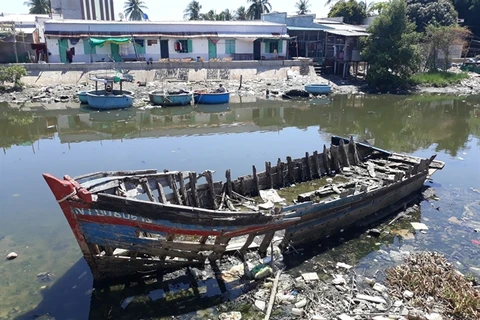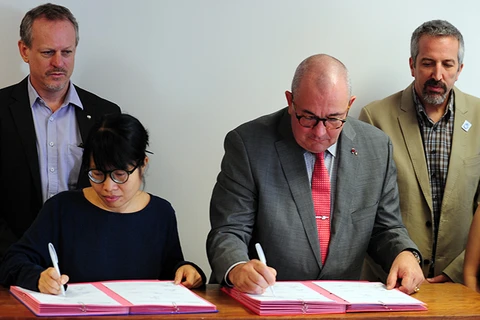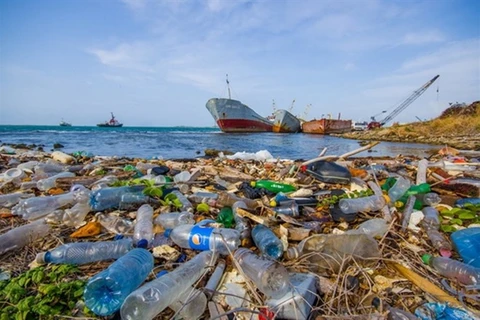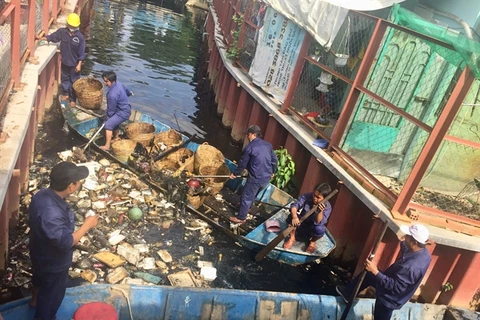 Nearly 80 percent of Vietnamese shoppers do not bring their own bags, resulting in the increasing use of plastic bags. (Photo: hanoimoi.com.vn)
Nearly 80 percent of Vietnamese shoppers do not bring their own bags, resulting in the increasing use of plastic bags. (Photo: hanoimoi.com.vn) HCM City (VNS/VNA) - Sustainability has been a growing topic of interest to Vietnamese consumers in recent years though awareness levels remain well below the global average.
According to Kantar’s latest study on the environment done on a global scale, environmental issues such as plastic waste, water pollution and air pollution are among the top five concerns of Vietnamese in addition to food safety.
Facing increasing climate changes along with escalating levels of pollution, especially in the two key cities of Hanoi and HCM City, there is an increasing environment consciousness among a group of Vietnamese consumers who are willing to take action to improve the situation such as reducing plastic waste, recycling and opting for healthier and sustainable lifestyles.
But such people only account for 35 percent whereas the global rate is 59 percent, Vo Thi Kim Nhu, senior account manager, Worldpanel Division in Vietnam, told a recent webinar.
Moreover, nearly 80 percent of Vietnamese shoppers do not bring their own bags, resulting in the increasing use of plastic bags, the study found.
Nhu also listed the reasons that prevent Vietnamese from living ‘green’ as knowledge barrier since authorities and enterprises do not propagate environmental protection, a belief the situation is not too bad, which requires an emphasis on the alarming state, and the fact that sustainable and environment-friendly products are hard to find and are expensive.
In fact, one of the activities that has been promoted and encouraged by the authorities and enterprises in Vietnam recently is recycling.
But Vietnamese consumers remain very vague about which products can be reused, recycled and replaced, where these products can be collected, how products are recycled, and what will happen to them after recycling, Nhu said.
Furthermore, a quarter of the study respondents said recycling is inconvenient.
Vietnamese consumers want manufacturers and authorities to take the lead in reducing environmental impacts and do not expect retailers to take action in limiting environmental damage.
In the past few years the Government has been undertaking environmental protection projects with the aid of local and foreign businesses, organisations and individuals.
For instance, nine leading companies in the fast moving consumer goods and packaging sectors formed the Vietnam Packaging Recycling Alliance (PRO Vietnam). They include TH Group, Coca-Cola, Friesland Campina, La Vie, Nestle, Nutifood, Suntory PepsiCo, Tetra Pak, and Universal Robina Corporation.
The establishment of this alliance promises many practical green initiatives and actions.
Besides, many initiatives have been taken by businesses such as using paper and recycled plastic straws and packaging in coffee and tea shops and supermarkets and food to non-food brands.
However, surprisingly, only 5 percent of participants could name manufacturers or brands that are taking environment-friendly initiatives.
“To foster more revolutionary changes towards a shared sustainable development, perhaps we need to consider conveying more green messages along with activities to inspire various consumer groups,” Nhu said.
Kantar's Worldpanel data also found that a majority of the aware consumer group stopped buying certain products and services because of their impact on the environment or society.
This implies the importance of this group of consumers. By involving and engaging with them brands will have opportunity to achieve a sustainable development in the future.
Doan Quoc Tuan, senior marketing executive at Tetra Pak, said: “Sustainability is no longer just a nice thing to do or trend. It is a licence to do business in the long term.”/.
VNA























